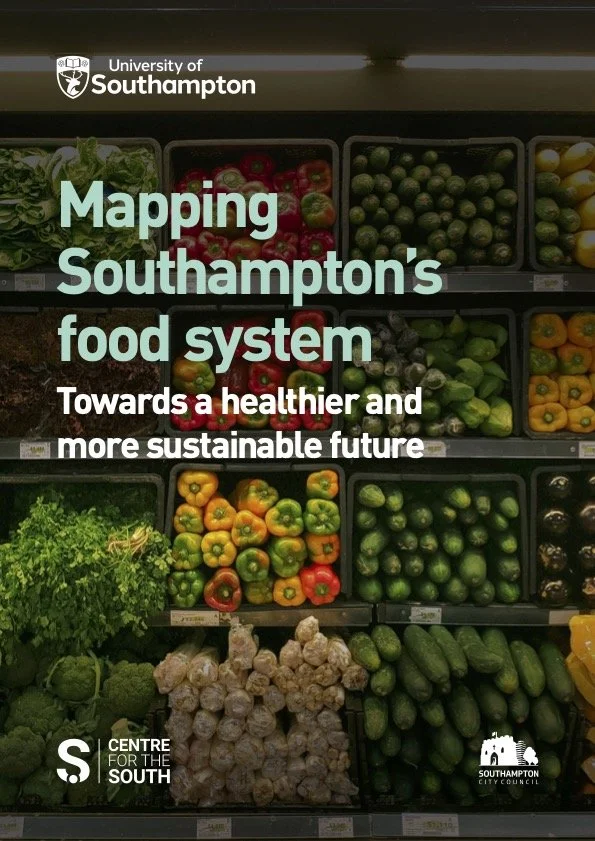New Policy Brief: Mapping Southampton’s Food System
A collaboration (previously introduced in March) between the University of Southampton’s School of Biological Sciences and the Southampton City Council, facilitated by the Centre for the South, has resulted in a policy brief outlining recommendations for a healthier and more sustainable future for the food system of the city.
To read the policy brief, click on the button. Read on for a short summary.
DOI: 10.5258/SOTON/PP0201
Why are Food Systems Important?
The report highlights that deprived areas of Southampton experience higher rates of child obesity and excess weight than the national average. Obesity, food insecurity, and high carbon emissions are influenced by a region’s food system and the availability of affordable, healthy diets.
According to this research, children in Southampton are more likely to be overweight or obese, suffer from dental decay, and rely on free school meals. Additionally, the region’s reliance on food imports causes high greenhouse gas emissions, impacting local air quality and the global climate.
“29% of Southampton’s businesses are associated with the food system, contributing up to £487.3 million to Southampton’s economy annually.”
In 2023, Southampton City Council sampled food availability and affordability in 27 grocery shops, mapping the region and discovering that over 9,000 people live in neighbourhoods not within 400 meters of an ‘adequate’ food store. They found that areas with limited access to nearby, affordable healthy food corresponded to areas of high deprivation.
Southampton’s food system is crucial for its economy and the health and wellbeing of its population. Improving access to healthy and affordable food can support deprived communities and enhance socioeconomic conditions within the city.
Food System Workshop
The University of Southampton and SCC hosted a workshop to gather insights from key local food system stakeholders, including public, private, and charitable organisations.
Key Findings:
Procurement Policies: Schools, hospitals and prisons, significantly influence the food environment. Higher standards of food quality, local produce, and a living wage for catering employees were identified as powerful tool for change.
Food Education: More education on food preparation, exposure to various healthy foods, and budgeting would empower the local community, especially with an enabling environment and food budget.
Up-skilling: Empowering local people through partnerships can help them engage with their food environment and shape the food system.
Existing Efforts: Capitalising on successes from organisations like The Big Difference can build on existing momentum.
A discussion addressed whether initial focus should be on health, sustainability, or both, with varied perspectives expressed. Whatever direction Southampton chooses can be a lever for change.
Case Study: Burgess Road
Burgess Road is near a residential area of high deprivation, with local businesses primarily consisting of takeaways. These businesses may disproportionately influence local food options and can inhibit healthier, more sustainable choices. Community partner collaborations may be able to positively influence local environments like Burgess Road.
Recommendations from the Policy Brief
This project has been led by researchers from the University of Southampton Faculty of Environmental and Life Sciences, and Public Health Officers from Southampton City Council. For references and a team list, read the full policy brief by clicking on the image below.





